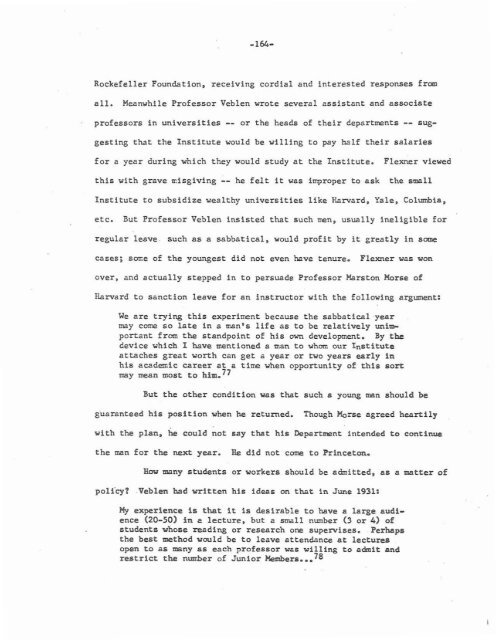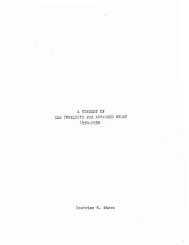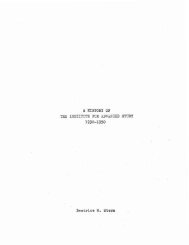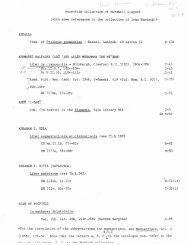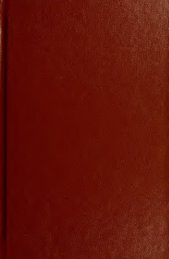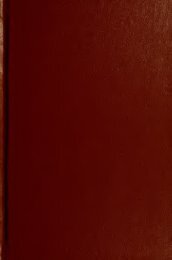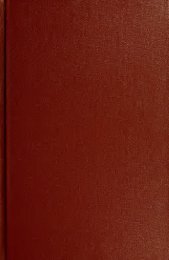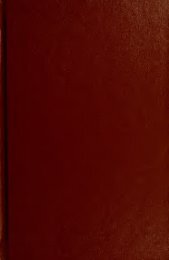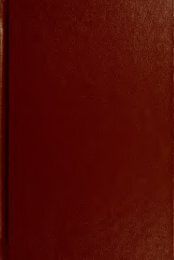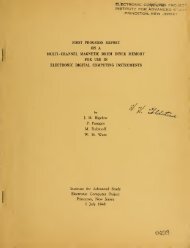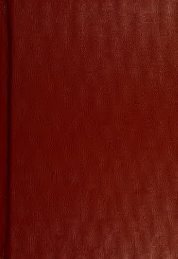- Page 1:
A HISTORY OF TEE INSTITUTE POR ADVA
- Page 5 and 6:
TmLE OF CONTESTS INTRODUCTION . . .
- Page 7 and 8:
1 \ -c. --- ft 5s safe to 52)- that
- Page 9 and 10:
ot;-tervise would have b ~en lackin
- Page 12 and 13:
medical school. Such a school, he s
- Page 14 and 15:
them to abandon their intention to
- Page 16 and 17:
in the "plans already in effect.* N
- Page 18 and 19:
2. B. Grznting only the Doctor's an
- Page 20 and 21:
men of the nost distinguished stand
- Page 22 and 23:
Frank Aydelotte of Swarthmore Colle
- Page 24 and 25:
to purckse, retaining the right to
- Page 26 and 27:
Board of Directors approved the pur
- Page 28 and 29:
man whose warm hwn qualities, wisdo
- Page 30 and 31:
Th9 third phase began with the Rode
- Page 32 and 33:
dominant classical tradition of the
- Page 34 and 35:
the United States and Canada. He ac
- Page 36 and 37:
expenditure of sorething like $500
- Page 38 and 39:
in dominating spirit znd interest t
- Page 40 and 41:
for college graduates, reseerch ins
- Page 42 and 43:
quality to hirrself. ft was a susta
- Page 44 and 45:
ment," without explanation. Dr. Fle
- Page 46 and 47:
November, 1930, creating enew the s
- Page 48 and 49:
easonable certainties they have lea
- Page 50 and 51:
third-year college stu&nt in thls c
- Page 52 and 53:
John C. French, A History of the Un
- Page 54 and 55:
men vith which he charged a few Eas
- Page 56 and 57:
tions in the hope that better days
- Page 58 and 59:
What could be expected, if a modern
- Page 60 and 61:
He wrote: I am sending you kere-uft
- Page 62 and 63:
worthy of your beneficent idealism.
- Page 64 and 65:
sible for the eonduct of the businm
- Page 66 and 67:
the intent to train and guide stude
- Page 68 and 69:
emitted as trustees give promise...
- Page 70 and 71:
criticize freely in whole or in par
- Page 72 and 73:
Mr. Roughton was an elder statesran
- Page 74 and 75:
even in America. Fs pledged hinelf
- Page 76 and 77:
the number to the fifteen provided
- Page 78 and 79:
Mr. Barnbergex's proposal gave the
- Page 80 and 81:
Vice-himn was provided for, The Boa
- Page 82 and 83:
CHAPTER fX - NOTES 1. Goodspeed, op
- Page 84 and 85:
Re shall, after conference with t k
- Page 86 and 87:
CHAfTER I11 PLAPriING TEE ESTITUTE
- Page 88 and 89:
in research, whereas, la projecting
- Page 90 and 91:
a delay in action. The Board could
- Page 92 and 93:
I have finished the second draft of
- Page 94 and 95:
Universities, being prirrarily inte
- Page 96 and 97:
\ . science; the school of economic
- Page 98 and 99:
merh~rs of the Institute, and perso
- Page 100 and 101:
applied science, and progress in ph
- Page 102 and 103:
it right be decided that schools in
- Page 104 and 105:
had all too ilttle of it. He had be
- Page 106 and 107:
as a location; the mjority advised
- Page 108 and 109:
Meanwhile, in Jznuary 1932, the Dir
- Page 110 and 111:
Institute were not required to teac
- Page 112 and 113:
and the natural sciences. 26 Suqris
- Page 114 and 115:
+ this cen chosen were drzwn togeth
- Page 116 and 117:
and laborious in a university, 35 D
- Page 118 and 119:
Director on a par with the Institut
- Page 120 and 121:
, furter, though still agreeing uit
- Page 122 and 123: I am firmly convinced that the absu
- Page 124 and 125: of the University had it held itsel
- Page 126 and 127: Foundation for Scientific Research,
- Page 128 and 129: 18. Minutes, Trusteesr meeting, 1/1
- Page 130 and 131: CHAmm IT TEE SCHOOL OF HAIkXWTfCS T
- Page 132 and 133: fields of rwtherratics and its eppl
- Page 134 and 135: \\ \ based on the lot of the young
- Page 136 and 137: one man was only a "nu~leus,~ vhile
- Page 138 and 139: they would meet zt Oxford Universit
- Page 140 and 141: Cruel indecision now assailed Birkh
- Page 142 and 143: destined in their judgment "to hit
- Page 144 and 145: California Institute of Technology'
- Page 146 and 147: wbtsoever. As for himelf, he looked
- Page 148 and 149: confidentially ex2ressed misgivings
- Page 150 and 151: hononed him, Dr. Einstein first vis
- Page 152 and 153: of the story, and photographs of Ei
- Page 154 and 155: My point was not that you were raki
- Page 156 and 157: uri tteri: The first problen! of co
- Page 158 and 159: sam thing to Dr. Weyl, plagued as h
- Page 160 and 161: sox Einstein is thus a distinct add
- Page 162 and 163: Unfortunately, Veblen used Flexnerl
- Page 164 and 165: over the "transferm of the three me
- Page 166 and 167: feared Veblents diqleasure should h
- Page 168 and 169: Professor Veblen bore in the Founde
- Page 170 and 171: either a full and permanent member
- Page 174 and 175: This was written when Veblen though
- Page 176 and 177: protect the Institute in deciding n
- Page 178 and 179: Then came the French Consul to offe
- Page 180 and 181: ideological extremes in Germany had
- Page 182 and 183: pointed on a rainy Manhattan dock w
- Page 184 and 185: in routing the correspondence. He c
- Page 186 and 187: Professor Veblen was one who had be
- Page 188 and 189: young n-mnber f xom Prague. He noti
- Page 190 and 191: -- '\ Ih you how why Einstein said
- Page 192 and 193: Oxford, he should seek to reopen ne
- Page 194 and 195: Alexander bve talked to re about Ho
- Page 196 and 197: enthusiasm, ability, and nm.bers fa
- Page 198 and 199: mar, of the joirit cnmittee of trrr
- Page 200 and 201: He estimated it would cost $3,000 t
- Page 202 and 203: 61. Flexner to Veblen, 12/9/32; 12/
- Page 204 and 205: 97. Plewser to bass, 2/19/34. Jesse
- Page 206 and 207: CHAPTER V TEZE SCHOOL OF ECONOMICS
- Page 208 and 209: those of the Vice-president beceae
- Page 210 and 211: about durq educaticnal directors. T
- Page 212 and 213: While Stewart mistrusted apoliticia
- Page 214 and 215: wanted, it was of the economist, an
- Page 216 and 217: ecause of his liberal policies, a d
- Page 218 and 219: was goins to London to become '.onm
- Page 220 and 221: were to be asserted in a series of
- Page 222 and 223:
No, I don't expect to be wholly a d
- Page 224 and 225:
friend of the Director since 1928.
- Page 226 and 227:
that neither he nor the Trustees wo
- Page 228 and 229:
and discontent among scholars. Vain
- Page 230 and 231:
as a member of the Board. 36 Hr. Fr
- Page 232 and 233:
and the luxury of agreeing with him
- Page 234 and 235:
onic point of view but from an hist
- Page 236 and 237:
When Mr. Maass received the minutes
- Page 238 and 239:
attitude on the acceptability of Ma
- Page 240 and 241:
consider itself as a location but r
- Page 242 and 243:
Dr. Flexner "quoted scripturem to e
- Page 244 and 245:
Unfortunately, this was a cmitment
- Page 246 and 247:
Dr. Flemer had kept President Dodds
- Page 248 and 249:
&re at last vas the kind of program
- Page 250 and 251:
He may have been hoping to secure f
- Page 252 and 253:
eceived, and of one "unethusiastic"
- Page 254 and 255:
ultiaately a budget of $100,000 a y
- Page 256 and 257:
But the beginning of September was
- Page 258 and 259:
economists could visit to talk abou
- Page 260 and 261:
of discontent for Flexner, though t
- Page 262 and 263:
egarded work of his career before h
- Page 264 and 265:
CHAPTER V - NOTES 1. Interview with
- Page 266 and 267:
37. Simon Flexner to Bernard Flexne
- Page 268 and 269:
71. Riefler to Flexner, 3/13/36. Ay
- Page 270 and 271:
country for classical hwnistic stud
- Page 272 and 273:
notions formed on the basis of defe
- Page 274 and 275:
mising.> His great vzlue to Fleer w
- Page 276 and 277:
lish nev objectives, say, in kerica
- Page 278 and 279:
In its tone this was less an outlin
- Page 280 and 281:
\ '. -\ would be imnaterial, provid
- Page 282 and 283:
Princeton: - The cooperation.. .fie
- Page 284 and 285:
eplied that he saw little llklihood
- Page 286 and 287:
and the burranities was clear. As h
- Page 288 and 289:
and unhealthful. He wanted to retur
- Page 290 and 291:
term of the concession (1937-19431,
- Page 292 and 293:
Princeton. At that p~ss Flexner ste
- Page 294 and 295:
too old to accumulate them at Teach
- Page 296 and 297:
sorPanofsky was at McCarmick H all,
- Page 298 and 299:
concessions to the De~rtment as did
- Page 300 and 301:
In 1936, he decided ta seek a lump
- Page 302 and 303:
Apparently the Director decided tha
- Page 304 and 305:
and after the most careful scrutiny
- Page 306 and 307:
of the Institute depends solely and
- Page 308 and 309:
to be such .that studies.. .will be
- Page 310 and 311:
CHASTER Vf - Notes I. Fosdick, op.
- Page 312 and 313:
34. Vekien to Flexner, 11/5/36. Fle
- Page 314 and 315:
CWTER VIf TOO MANY GENERALS The est
- Page 316 and 317:
General Education Board in 1925 to
- Page 318 and 319:
and how helpful I am sure he is goi
- Page 320 and 321:
order of business only a brief stet
- Page 322 and 323:
. of the Trustees concurred. They k
- Page 324 and 325:
From the time of his conversation w
- Page 326 and 327:
-317- with rrembers on behalf of th
- Page 328 and 329:
sites. Flexner'a reply was courteou
- Page 330 and 331:
near the apposite University depart
- Page 332 and 333:
The experiment of cooperating with
- Page 334 and 335:
On the same day he wrote to Mr. Bam
- Page 336 and 337:
was out of the question. To complet
- Page 338 and 339:
As the proposal for the first build
- Page 340 and 341:
mathematic stipends w wld better be
- Page 342 and 343:
than it was uorth, and the Universi
- Page 344 and 345:
joint basis. The Departrrrent agree
- Page 346 and 347:
outine matter..,The vzrious univers
- Page 348 and 349:
and inviting then, since he ves the
- Page 350 and 351:
professors in the School of Mathema
- Page 352 and 353:
were faculties entirely self-govern
- Page 354 and 355:
sthndards he discussed with Profess
- Page 356 and 357:
The Director did not consult the fa
- Page 358 and 359:
one group for the trustees, the oth
- Page 360 and 361:
continue to suggest the names of li
- Page 362 and 363:
the conferences ended as Professors
- Page 364 and 365:
k t US get our minds so full of the
- Page 366 and 367:
leased. The Institute would advznce
- Page 368 and 369:
to protect funds from the faculty,
- Page 370 and 371:
6. Maass to Flexner, 7J10/33. 7. In
- Page 372 and 373:
46, Flexner to Peblen, 12/4/36. 47.
- Page 374:
84. Minutes, Trustees' meeting, 1/2


